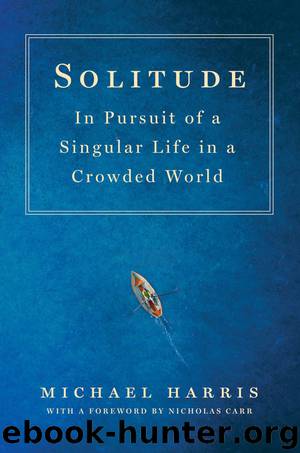Solitude: In Pursuit of a Singular Life in a Crowded World by Michael Harris

Author:Michael Harris [Harris, Michael]
Language: eng
Format: azw3, epub
Publisher: St. Martin's Press
Published: 2017-04-04T04:00:00+00:00
Part IV
Knowing Others
I hold this to be the highest task for a bond between two people: that each protects the solitude of the other.
—Rainer Maria Rilke
9
Social Stories
When I walk into Keith Oatley’s office at the University of Toronto I notice a worn volume of Virginia Woolf’s Three Guineas resting on his desk—the sort of book that smells faintly of almonds and damp. Oatley’s liver-spotted hand strays to its cover as he says hello, and I have the lumpish impression that I’ve interrupted.
Oatley is seventy-five years old and possessed of a prickly intellect, a cragged brow, and bushy caterpillar eyebrows that he uses to punctuate his remarks. He is both a novelist and a professor emeritus of cognitive psychology; it’s this rare combination of interests that has drawn me here—Oatley has devoted much of his life to understanding what happens in the mind as we read.
I’ve come with a particular question in mind and, sitting opposite Oatley, in the student’s chair, I try to map it out. Proust once defined reading as “that fruitful miracle of a communication in the midst of solitude.”132 I explain that I want to better understand what that means. How and why do we communicate “in the midst of solitude”? What does that detachment change about the kinds of messages we receive from books? And what exactly is the “fruitful miracle” that a reader’s withdrawal makes possible? “What,” I say at last, “was Proust talking about?”
Oatley glances out the window and says, “Reading is very different from our day-to-day life, isn’t it?” This seems a little obvious, and for a few seconds I worry he’ll stop there. But then he clicks onward, tapping one hand in the palm of the other. “When we read, we can become people who we are not. A metaphorical process occurs. One’s self becomes Elizabeth Bennet or Anna Karenina. One becomes a fictional protagonist. We can live more lives than our own.” If Woolf had been able to speak from that copy of Three Guineas on the table, she might have chimed in with something she once wrote in a letter to Ethel Smyth: “the state of reading consists in the complete elimination of the ego.”133 People talk about getting “lost” in books, and I suppose this is what they mean—that the fortress we build around ourselves, the pretense of a single “self” that protects us as we shuffle through our days, begins to crumble ten pages into a good novel, letting a new voice, a new identity, wash over us.
When I read Nabokov’s Lolita and spend a few days taking on the voice of a pedophile and murderer, or when I read Wharton’s The House of Mirth and get some glimpse of what it means to be a woman enduring the limitations of a misogynist society, these are gifts of experience. But those gifts can be received only when I quiet myself, calm my otherwise feverish ego. This process—the solitary giving over of the mind—is something that readers train themselves to do over the course of years.
Download
Solitude: In Pursuit of a Singular Life in a Crowded World by Michael Harris.epub
This site does not store any files on its server. We only index and link to content provided by other sites. Please contact the content providers to delete copyright contents if any and email us, we'll remove relevant links or contents immediately.
Rewire Your Anxious Brain by Catherine M. Pittman(18654)
Talking to Strangers by Malcolm Gladwell(13370)
The Art of Thinking Clearly by Rolf Dobelli(10489)
Mindhunter: Inside the FBI's Elite Serial Crime Unit by John E. Douglas & Mark Olshaker(9342)
Becoming Supernatural by Dr. Joe Dispenza(8217)
Change Your Questions, Change Your Life by Marilee Adams(7780)
Nudge - Improving Decisions about Health, Wealth, and Happiness by Thaler Sunstein(7706)
The Road Less Traveled by M. Scott Peck(7603)
The Lost Art of Listening by Michael P. Nichols(7506)
Mastermind: How to Think Like Sherlock Holmes by Maria Konnikova(7347)
Enlightenment Now: The Case for Reason, Science, Humanism, and Progress by Steven Pinker(7313)
Win Bigly by Scott Adams(7197)
The Way of Zen by Alan W. Watts(6614)
Daring Greatly by Brene Brown(6513)
Big Magic: Creative Living Beyond Fear by Elizabeth Gilbert(5771)
Grit by Angela Duckworth(5614)
Ego Is the Enemy by Ryan Holiday(5448)
Men In Love by Nancy Friday(5240)
The Laws of Human Nature by Robert Greene(5208)
